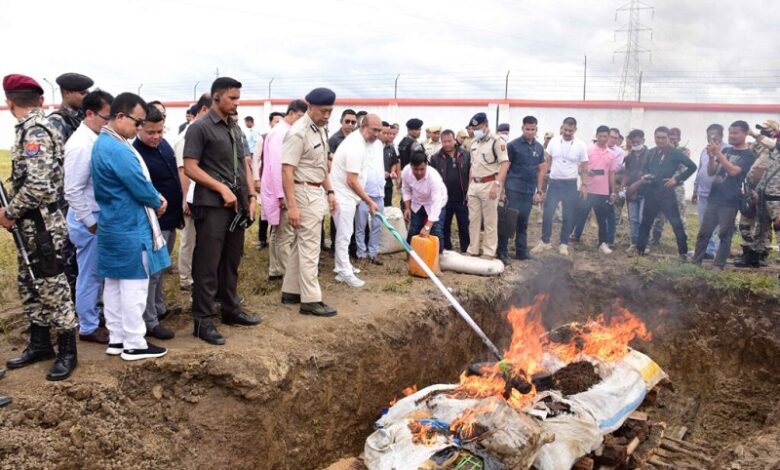The Menace of Drugs: Unravelling the Turmoil in Manipur

By AGNIBEENA GHOSH
In early May, under the cloak of darkness, a group of armed men emerged from the hills above. Their menacing war cries and gunshots pierced the stillness of the night, striking terror into the hearts of the villagers below. Khunaijam Shanti vividly recalls the night of horror when her village, Dolaithabi, came under attack. Fearing for their lives, she and her fellow villagers fled their homes, leaving behind a scene of chaos and destruction.
The root cause of the conflict lies in an affirmative action dispute that ignited ethnic tensions in Manipur. The state, located in India’s north-eastern region, has been grappling with clashes between the majority Meitei community, who mostly practice Hinduism, and the tribal Kuki minority, predominantly Christians. Tragically, more than 130 people have lost their lives in the violence, and around 60,000 have been displaced, turning them into refugees in their own homeland.
The Meitei people, residing in community villages across the vast valley, including the capital city of Imphal, find themselves at the centre of the conflict. On the other hand, the Kukis inhabit their chief-run villages in the rolling hills. The ongoing violence has led to an almost complete segregation of the two groups, with little interaction between them.
Dolaithabi, among four villages in the Imphal East district, experienced a night of terror as it fell victim to the Kuki attack. These Meitei-dominated villages, with nearly 3,000 inhabitants, were particularly vulnerable due to their close proximity to Kuki settlements. In several regions like these, security forces have established buffer zones in an attempt to restore peace. Both sides have seen civilians forming “village defence forces” and building bunkers manned by armed volunteers.
The dammed river Iril flows calmly past villages adorned with sloped corrugated tin homes. Hand-tended rice farms cover the floodplains, surrounded by lush slopes that lead to the emerald green hills, which seem to touch the clouds.Despite its beauty, this valley remains vulnerable to attacks, with the Kukis having a strategic advantage due to their vantage point from the hills. As a result, civilians living in these regions are always on high alert, aware that violence can erupt at any moment.
Lenin Lamabam, a senior officer of Manipur’s military police, highlighted the area’s precarious situation. Along with 80 of his men and hundreds of border forces, he patrols the region, trying to maintain a semblance of peace and security. The landscape, once a picturesque setting, is now marred by the remains of burnt-out homes and vehicles, casting a shadow over the region’s serenity. Some brave men have returned to their homes, attempting to resume their livelihoods during daylight hours. However, the prospect of survival has become perilous, as farmers from both communities have been targeted and shot while working in the fields. The sudden escalation of violence has left many perplexed, including 60-year-old widow Chanam Tapha, who now resides in a relief camp.
The violence has led to the displacement of tens of thousands of people, with half of them being Meiteis seeking refuge in relief camps within the valley. The Leitangpokpi village, once bustling with about 100 homes, two pharmacies, a bazaar, and a primary school, now stands half-deserted. Amidst the ruins, an unexpected exhortation emerged from a damaged home: a paper pasted on a corrugated tin wall advocating for a “war on drugs.” A local committee urged people to cease poppy plantation and “save our generation.”
Underlying tensions in Manipur are a result of a complex interplay of various factors, with one significant element being a crackdown on drug cultivation in recent years. The state government, led by Chief Minister N Biren Singh, initiated a controversial campaign targeting poppy farming. Since 2017, the government claims to have destroyed over 18,600 acres of poppy farms, predominantly located in Kuki-inhabited areas. Manipur, situated among four north-eastern Indian states bordering Myanmar, faces a drug-addiction crisis and is in close proximity to the world’s second-largest opium producer.
Amidst the ongoing violence and ethnic clashes in the region, another fault line is brewing over the issue of undocumented illegal immigrants from neighbouring Myanmar. The state shares a significant near-400km border with Myanmar, and concerns have arisen about the potential influx of refugees from the civil war in Myanmar. Stickers with the message “go back, Burmese refugees” have begun appearing on storefronts and residences across Meitei villages, adding to the already simmering tensions.
Chief Minister N Biren Singh has expressed repeated concerns about the situation in Myanmar leading to an inflow of refugees, particularly among the ethnically close Kuki community. More than 40,000 refugees have reportedly entered and sought refuge in neighbouring Mizoram. The Manipur state government panel identified 2,187 immigrants from Myanmar in four districts of Manipur until the end of April. An official note highlights the presence of a “large number of illegal migrants” and attributes the recent violence to influential illegal poppy cultivators and drug lords from Myanmar settling in Manipur.
However, life among the ordinary people in the region appeared to be harmonious and free from friction before the outbreak of recent violence. In villages nestled against the foothills, Meiteis and Kukis had coexisted peacefully. They interacted amicably, with Meiteis traveling uphill to gather firewood and employ excavators for road construction, while Kukis ventured down to do business in Meitei villages. The two communities even engaged in joint investments in local small savings funds, reflecting a level of trust and cooperation.
The sudden transformation of friends and neighbours into enemies has left many baffled. Khunaijam Shanti, a resident of the affected area, questions how these once harmonious relationships turned sour overnight. She wonders if outsiders instigated the violence, sowing seeds of discord between the Meiteis and the Kukis.
The situation has been further complicated by the presence of undocumented illegal immigrants from Myanmar. The fear of an influx of refugees and concerns about the impact on the existing social fabric have heightened tensions in the region. The fault line over this issue adds yet another layer of complexity to the already fraught situation in Manipur.
The Manipur government’s focus on controlling illegal poppy cultivation and drug trafficking is significant, given the state’s proximity to the world’s second-largest opium producer, Myanmar. The eradication of illegal poppy farms can have a direct impact on curbing drug-related crimes and maintaining law and order in the region. Ultimately, the key to resolving the brewing fault line lies in recognizing the shared history and cultural ties between the Meiteis and the Kukis. By focusing on common ground and building bridges of understanding, Manipur can strive towards a more harmonious and inclusive future, where differences are celebrated and conflicts are resolved through dialogue and cooperation.
As the landscape of Manipur continues to heal from the wounds of violence, the challenges faced by the affected communities remain significant. The displacement of thousands has created a humanitarian crisis, with many struggling to rebuild their lives and livelihoods. The scars left behind by the violence serve as a stark reminder of the urgent need for reconciliation and peace-building efforts. A balanced approach to drug eradication, coupled with efforts to promote economic development and social cohesion, can pave the way for a more secure and prosperous Manipur. With the support of the central government and the dedication of local leaders, there is hope that Manipur’s scenic landscape can once again thrive, fostering a sense of unity and harmony among its diverse communities.
(edited from source: BBC news)






